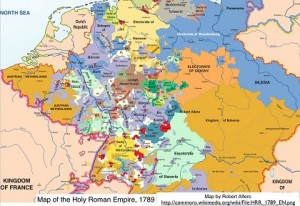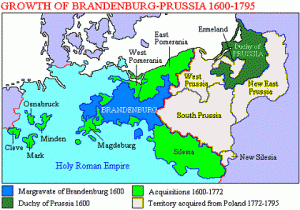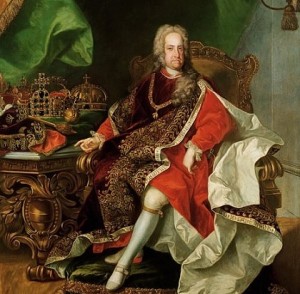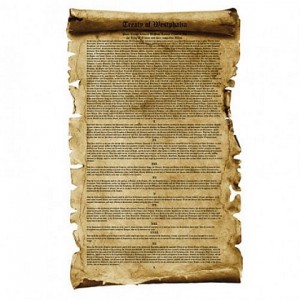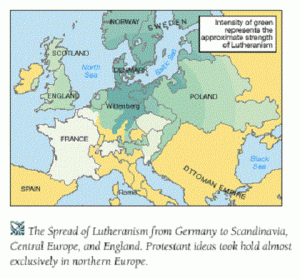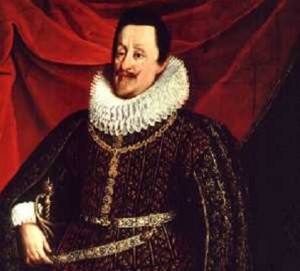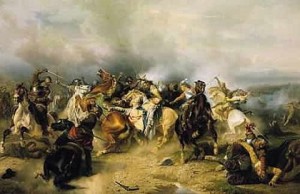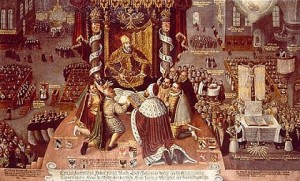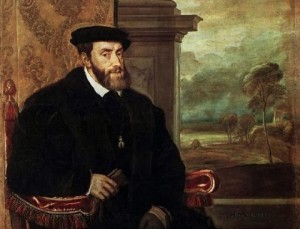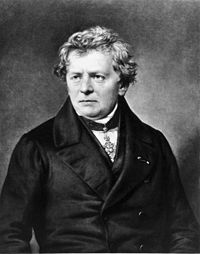By the eighteenth century, none of the other states of the German empire were strong enough to have territorial ambitions to match those of Prussia and Austria. Some of the larger states, such as Saxony, Bavaria, and Wuerttemberg, also maintained standing armies, but their smaller size compelled them to seek allies, some from outside the empire. … [Read more...]
Austria and Prussia
The most important German power after the Peace of Westphalia was Austria, followed by a few other states with much smaller populations, most notably Brandenburg, Saxony, and Bavaria. Austria retained its preeminence until the second half of the nineteenth century, but in the eighteenth century Brandenburg had become a serious rival, annexing … [Read more...]
The Age of Enlightened Absolutism, 1648-1789
Although the Holy Roman Empire no longer had a significant role in European politics after the Thirty Years' War, it remained important in Germany, providing a framework for the many German states' and cities' conduct of their public affairs. The Reichstag, which remained in session at Regensburg from 1663 until the empire's dissolution in 1806, … [Read more...]
The Peace of Westphalia
The Peace of Westphalia largely settled German affairs for the next century and a half. It ended religious conflicts between the states and included official recognition of Calvinism. Its signatories altered the boundaries of the empire by recognizing that Switzerland and the Netherlands had become sovereign states outside the empire. Portions of … [Read more...]
The Counter-Reformation and Religious Tensions
The Peace of Augsburg brought peace but did not settle the religious disagreements in Germany. For one thing, its signatories did not recognize Calvinism, a relatively stringent form of Protestantism that was gaining prominence around the time the Augsburg treaty was signed, in what has been called the Second Reformation. Adherents to both … [Read more...]
The Thirty Years’ War – Military Campaigns
The Thirty Years' War resulted from a local rebellion, but the admixture of religion transformed it into a European conflict that lasted for more than a generation and devastated Germany. In 1618 Bohemian nobles opposed the decision of Emperor Matthias (r. 1608-19) to designate his Catholic cousin Ferdinand king of Bohemia. Instead, the nobles … [Read more...]
The Thirty Years’ War
Germany enjoyed a time of relative quiet between the Peace of Augsburg, signed in 1555, and the outbreak of the Thirty Years' War in 1618. The empire functioned in a more regular way than previously, and its federal nature was more evident than in the past. The Reichstag met frequently to deal with public matters, and the emperors Ferdinand I (r. … [Read more...]
The Peace of Augsburg
Imagine a country where the ruler’s religion dictated your own. No choice. No freedom of belief. Just the heavy hand of authority deciding how - and to whom - you should pray. Welcome to 16th-century Germany, a land torn by one of Europe’s fiercest struggles: the battle between Catholicism and Protestantism. And at the heart of this storm stood one … [Read more...]
Resistance to Lutheranism in Germany
Although Lutheranism had powerful supporters, its survival was by no means certain. Its main opponent was the Habsburg emperor Charles V, who had inherited Spain, the Netherlands, southern Italy, Sicily, and the Austrian lands as patrimony and who hoped to restore the unity of the German Empire by keeping it Roman Catholic. Charles had been out … [Read more...]
March 16 in German History
March 16, 1021 Death of St. Heribert von Köln. Heribert von Köln was born in Worms in ca. 970 and educated at the cathedral school in Worms. He was ordained a priest in 994. In 999 he was named Archbishop of Cologne by the emperor Otto III. He was confirmed in that position by the Pope Sylvester II. (In the Holy Roman Empire a.k.a. the German … [Read more...]
- « Previous Page
- 1
- …
- 109
- 110
- 111
- 112
- 113
- …
- 139
- Next Page »
